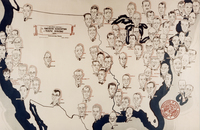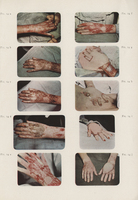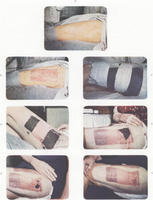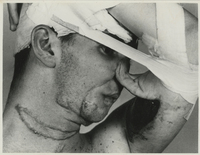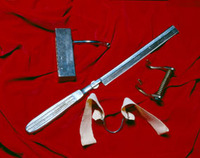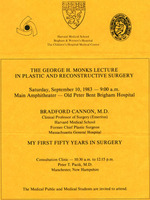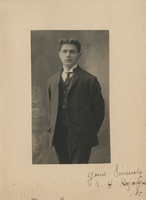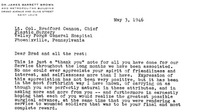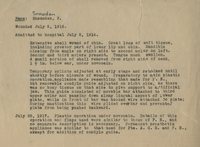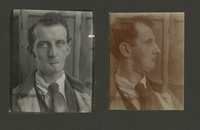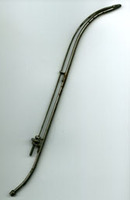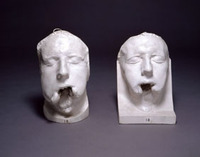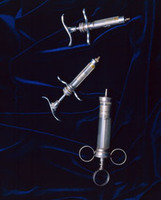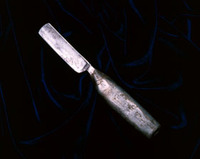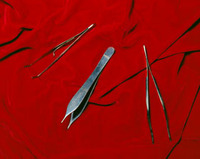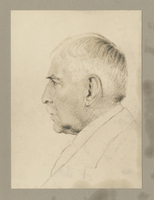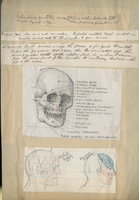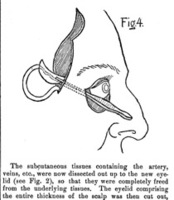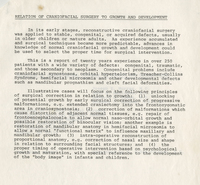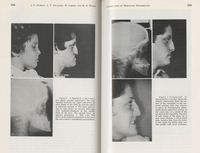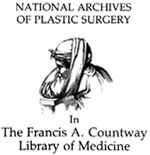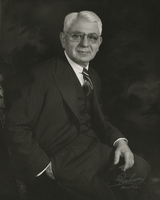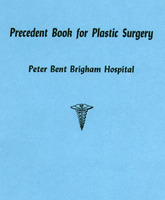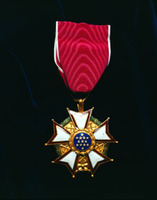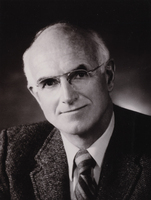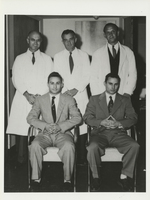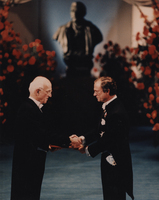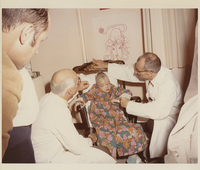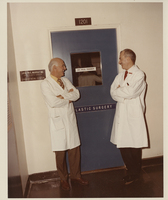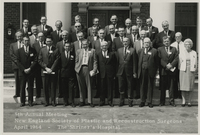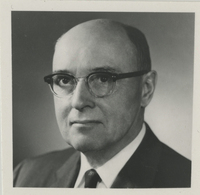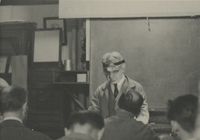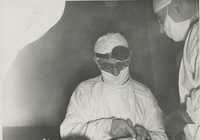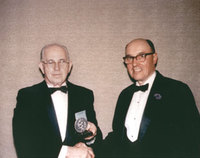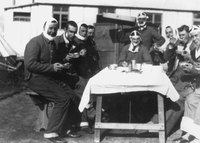Browse Items (37 total)
- Tags: National Archives of Plastic Surgery
Sort by:
Cocoanut Grove injuries
On November 28, 1942 the Cocoanut Grove, a nightclub in Boston's South End caught on fire. There were nearly one thousand people crammed inside and over five hundred of them died. Though Dr. Cannon was drafted earlier in 1942, his induction was…
Burn Study
In the early 1940's, Dr. Cannon and Dr. Oliver Cope (1902-1994) became concerned about the effectiveness of tannic acid, then the most common treatment of burns used in Boston. In a study conducted at the Massachusetts General Hospital, Drs. Cannon…
Arm flap rhinoplasty
In 1943, Dr. Cannon joined the Medical Corps of the United States Army. He served in the plastic surgery unit at the Valley Forge General Hospital in Pennsylvania, as assistant chief and then chief. This unit performed over 15,000 operations without…
Surgical Instruments of Bradford Cannon
From left to right:
A vacuum device used in skin grafting.
Split Skin Grafting Knife with grooved shaft into which razor sharp blades with a rigid backing are slid.
Wire arch used to minimize tension at the suture line after the cleft lip repair.…
Pamphlet from 1990 Monks Lecture
The George H. Monks Lectureship was established in 1972, with the support and encouragement of his son, the late Reverend G. Gardner Monks, in order to improve the care of disfigured patients requiring plastic and reconstructive surgery. To achieve…
Pamphlet from 1985 Monks Lecture
The George H. Monks Lectureship was established in 1972, with the support and encouragement of his son, the late Reverend G. Gardner Monks, in order to improve the care of disfigured patients requiring plastic and reconstructive surgery. To achieve…
Dr. Kazanjian at his graduation from Harvard Dental School
Dr. Kazanjian was born in Turkish Armenia on March 18, 1879. To escape the civil strife of his homeland, he came to the United States in October 1895. He settled in Worcester, Massachusetts, and began working in a wire mill. It was at the mill that…
Case Report of Corporal Snowdon
During World War I, Dr Kazanjian used his unique surgical skill to treat the soldiers severely disfigured during combat. In 1915, he was appointed Dental Chief of the First Harvard Unit organized to serve overseas with the British Forces. He…
Corporal Snowdon
During World War I, Dr Kazanjian used his unique surgical skill to treat the soldiers severely disfigured during combat. In 1915, he was appointed Dental Chief of the First Harvard Unit organized to serve overseas with the British Forces. He…
Moulages of Corporal Snowdon
During World War I, Dr Kazanjian used his unique surgical skill to treat the soldiers severely disfigured during combat. In 1915, he was appointed Dental Chief of the First Harvard Unit organized to serve overseas with the British Forces. He…
Fine Tipped Tissue and Thumb Forceps
Plastic surgery of the face requires patience and accuracy since the outcome is always visible. Well-adjusted instruments are essential to avoid tissue trauma and scarring. Exact instruments like the fine tipped tissue and thumb forceps are for…
Paper on Craniofacial Surgery
Written by Joseph E. Murray M.D., John B. Mulliken, M.D., Leonard B. Kaben, M.D., and Anthony D. Holmes, M.B.B.S., this is the introduction to a report that discusses the lessons learned by surgeons through twenty years experience in the repair of…
Correction of Midfacial Deformities
Published in 1971 in Surgical Clinics of North America, this article, written by Joseph E. Murray , M.D., Lennard T. Swanson, D.M.D., Melvin Cohen, D.M.D., and Mutaz B. Habal, M.D., illustrates the interdisciplinary nature of the diagnosis and…
Varaztad H. Kazanjian
Varaztad Hovannes Kazanjian's pioneering contributions to plastic surgery transformed the new discipline into an esteemed surgical specialty. He recorded his unique treatments and methods in one hundred and fifty journal articles and he co-authored…
Legion of Merit
Awarded to Dr. Cannon by the War Department in 1946. The citation reads, "By his professional skill, sound judgement, and conscientious devotion to duty, he was instrumental in making it possible for young men who might otherwise have been maimed for…
Joseph E. Murray
Dr. Joseph E. Murray, recipient of the Nobel Prize in Physiology or Medicine in 1990, is well known for his pioneering work on kidney transplants and research on immunosuppression. Dr. Murray has also had a long and distinguished career in facial…
Dr. Murray and Dr. Tessier with patient
Born in Brittany, in 1917, Paul Tessier presented the first paper on craniofacial surgery in 1967. Dr. Tessier worked with Dr. Murray at the Craniofacial Clinic in the 1970s and 1980s.
Dr. Murray and Dr. Tessier standing in front of the Plastic Surgery Unit at Children's Hospital
Born in Brittany, in 1917, Paul Tessier presented the first paper on craniofacial surgery in 1967. Dr. Tessier worked with Dr. Murray at the Craniofacial Clinic in the 1970s and 1980s.
Bradford Cannon
Dr. Bradford Cannon was one of the early plastic surgeons recognized as such to practice in Boston. Dr. Cannon is well known for his important contributions toward the advancement of the treatment of burns; he also worked hard to ensure that plastic…
Dr. Kazanjian Teaching
In 1905, Dr Kazanjian accepted a position as an Assistant in Prosthetic Dentistry at the Harvard Dental School and began a teaching association that continued for the rest of his career. He later became head of that department in 1912. Other faculty…
Group of Patients at Dr. Kazanjian's Ward
During World War I, Dr Kazanjian used his unique surgical skill to treat the soldiers severely disfigured during combat. In 1915, he was appointed Dental Chief of the First Harvard Unit organized to serve overseas with the British Forces. He…

